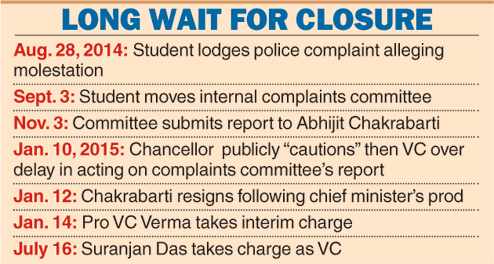
The status quo over the molestation complaint that had sparked five months of unrest at Jadavpur University until January was lost in the din of a torch rally by students on Wednesday to mark the first anniversary of #hokkolorob.
The internal complaints committee that had probed the allegation by an undergraduate arts student mentions "sexual harassment" in its report to the university last November.
The concluding remarks in the report, a copy of which is in Metro's possession, states that the complaint "can be broadly considered as a case of sexual harassment on account of the scuffle and unwelcome verbal exchange between the complainant, her friend on one hand and the students on the other hand".
The complainant had alleged that she was dragged into a boys' hostel and molested during a campus festival.
No action has been taken so far on the basis of the report, although it came from a panel constituted under The Sexual Harassment of Women at Workplace (Prevention, Prohibition and Redressal) Act, 2013.
Amit Sen, a former dean of law at Calcutta University, said: "Section 3 (2) of the Act says that humiliating treatment likely to affect a person's health or safety may amount to sexual harassment. The committee has said that unwelcome verbal exchanges... were humiliating enough to affect her (complainant) health. Then why couldn't the university table the report in the executive council until recently and take any action against the offenders?"
High court veteran and former mayor Bikash Ranjan Bhattacharyya said the university should have "sought legal opinion on what could be done in the light of the findings mentioned in the report".
Senior advocate Arunava Ghosh said: "I have doubts whether the case could be considered one of sexual harassment because unwelcome verbal exchange and scuffle does not always amount to sexual harassment. It varies from case to case. But it can always be broadly considered as a case of physical assault and the university should have acted accordingly."
Asked why he didn't act on the report when he was in charge, former vice-chancellor Abhijit Chakrabarti said he had sent it to governor Keshari Nath Tripathi and forwarded a copy to the government. "The chancellor verbally told me to send the report. The higher education department had written to me to send a copy of the report. They are my superiors. So I sent the report to them before placing it in the executive council," he told Metro.
Sources in the chancellor's office said he had sought a report on what action had been taken based on the findings of the report, not the report itself.
In the six months after Chakrabarti resigned, his immediate successor - pro-vice chancellor Ashish Swarup Verma, who was the interim VC till Suranjan Das took over in July - convened several meetings of the executive council but didn't table the report.
When Metro asked Verma why he didn't act on the report during the period he was the interim vice-chancellor, he said: "The findings failed to give any clear-cut message as to whether sexual harassment had taken place.... We thought it won't be proper of us to act when there are no conclusive findings."
Verma added that the authorities tabled the report in the last executive council meeting on September 1.
Vice-chancellor Das declined to comment on why no action had been taken.
The option of reinvestigating the complaint has not been exercised either.
"Early this year, the university had reconstituted the internal complaints committee, reducing the size of the panel to speed up investigations. The case could have been forwarded to the committee," legal expert Sen said.
On September 1, JU decided to set up a new committee with elected student representatives to look into harassment complaints.
But the university has yet to decide whether this committee would reinvestigate the molestation complaint that was the trigger for the turmoil.











